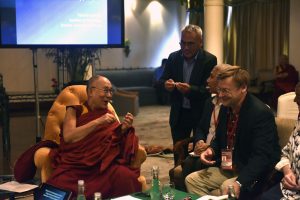
His Holiness with Konstantin Anokhin
Photo Tenzin Phende/DIIR
Fear and suspicion are two elements that hinder mutual compassion said His Holiness the Dalai Lama, speaking at the first Russian scientists and Buddhist scholars dialogue held in New Delhi.
The five day session commenced on August 5 with a two day preliminary discussion between Russian scientists and Buddhist scholars. His Holiness, who has professed his keen interest in the relationship between science and Buddhism, said that he has been driven since childhood to study mechanical things and this is what sparked his interest in science.
“In the late 20th century and early 21st century more and more scientists have begun to find evidence that such experiences as meditation and mind training affect our brains in previously unforeseen ways—this is called neuroplasticity”, His Holiness said.
Professor Konstantin Anokhin from the PK Anokhin Institute of Normal Physiology, Moscow, gave his presentation, Unity of Mind-Brain: Holistic Approaches from the Russian Neuroscience of Higher Brain Functions. Anokhin’s discourse on consciousness was followed by Yuri Alexandrov’s Non-Disjunctive Approach to Consciousness and Emotion: a Culture-Specific View.
Tatyana Chernigovskaya of St Petersburg University spoke about how language and time have thrown more light on researches into the nature of mind. His Holiness the Dalai Lama referred to Wolf Singer as mentioned by Chernigovskaya and said that the brain, having no central authority, reflected the Buddhist notion of there being no independent self.
While the discussion largely revolved around the nature of consciousness, His Holiness briefly mentioned the dire situation of countries embroiled in tension. “The global economy and the effects of climate change are not limited by national borders. It’s the idea of ‘us’ and ‘them’ we have to restrain, because it so easily becomes the basis for violence. We have to educate people to understand that we are all part of humanity”, he said.
In conclusion, His Holiness urged Russian scientists to work with western scholars and Tibetan Buddhist scholars in the study of Buddhism and science saying, “Russian scholars have an immense knowledge of science. They should…participate in the future. We could learn a lot from each other”.




 Print
Print Email
Email